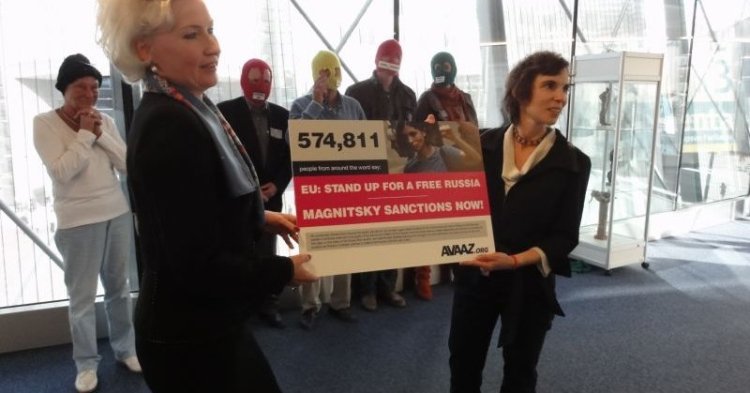The New Federalist: Could you remind us what about is the vote on “Magnitsky Sanctions” in committee in the European Parliament this week?
Stephanie Brancaforte: The so-called Magnitsky sanctions target Russian officials involved in the death of the international lawyer Sergei Magnitsky. MEP Kristiina Ojuland submitted a proposal for the EU governments to make a list of about 60 suspected officials and to impose an EU-wide visa ban and asset-freeze on the lot. The EP Foreign Affairs Committee - to whom Avaaz delivered its campaign last week - adopted this proposal by 62 votes against two last week.
Sergei Magnitsky, a Russian lawyer, died in November 2009 after being held for 358 days in a pre-trial detention centre. He had been arrested himself after alleging systematic and large-scale corruption and theft from the Russian government sanctioned by officials. Though suffering from serious ill health, he was refused adequate medical treatment and died eight days before he would have had to be released or brought to trial.
TNF: Is it so important that Europe take a political action on this subject?
Stephanie Brancaforte: The death of Sergei Magnitsky is part of a pattern of government injustice and manipulation of the judiciary in Russia. More recently, the condemnation of Pussy Riot focused world attention on the tightening repression in Russia:clamping down on public protest, electoral fraud, media intimidation, banning gay rights parades for 100 years, and detaining and beating opposition leaders like chess champion Garry Kasparov.
Passage of the Magnitsky sanctions would finally present the Kremlin’s inner circle with concrete consequences to counteract their systematized attack on democracy and transparency. A strong political signal against corruption and impunity must be sent to Putin and the Russian regime. After the US launched a similar initiative, we call on the EU to take a stand against human rights abuses.
TNF: Your organization, Avaaz.org, collected almost 600,000 signatures to support the European Parliament in this process. Why is it important that civil society is mobilized about this question?
Stephanie Brancaforte: There was a very big response to this campaign and MEPs were impressed by such mobilisation with senior members of the Foreign Affairs Committee receiving the petition ahead of the Committee decision. Many national parliaments and assemblies across Europe have already spoken out to follow the similar initiative launched by the US on Magnitsky Sanctions. The 575,000 citizens who raised their voice through the Avaaz petition are giving a strong mandate to EU officials to introduce these sanctions.
TNF: How can you collect all these signatures? Is it because your organization is active beyond national borders?
Stephanie Brancaforte: Avaaz is a global campaigning organisation with over 16 million members from every country on the planet. The power of this community comes from the speed at which it can mobilise, the insight it brings to targeting the right decision maker with the right ask. The Internet is giving the world a unique organising capability. Before people could only take the streets to influence change, now they can email, tweet or facebook decision makers and generate pressure faster than ever before. The Avaaz model is incredibly agile and able to move fast to influence “crisitunities” and work to influence decision makers around key tipping point moments.
Opinion polls demonstrate that there is a powerful democratic consensus across the world on issues such as poverty, human rights or climate change - but there is also a big gap between citizens’ values and how politicians address them. As people’s engagement in politics decrease there is a growing will from citizens to impact on issues they are concerned about. While the media cover concerning issues but offer no scope to do anything about it, Avaaz invites people to take their concern to the next level by turning that into action/solutions. Avaaz brings people hope and a chance to impact on issues that before may never change. The result is already the largest global online movement in history.


Follow the comments: |
|
